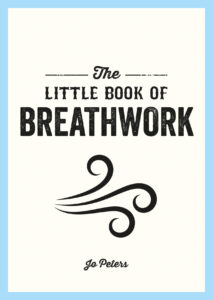
by Jo Peters
The body’s autonomic nervous system controls all our involuntary functions, like heart rate and digestion. This nervous system is divided into two branches:
Sympathetic nervous system, or “fight or flight” mode
This controls when the body needs to activate a “fight or flight” response in reaction to a perceived danger. When the body is stressed, it exists in this state and might affect involuntary functions, such as raising the heart rate and pausing any processes that aren’t urgent.
Parasympathetic nervous system, or “rest and digest” mode
When the body is not under any perceived stress, the “rest and digest” state is activated. This allows the involuntary functions that are less pressing for instant survival to proceed, such as digesting food properly.
Breathing is one involuntary function that can be consciously controlled using breathwork exercises. Therefore, purposefully adjusting your breathing pattern can dictate which nervous system is activated, consequently affecting a whole host of body functions.
When a breathwork exercise involves lengthening an exhale or slowing down the breath, it signals to the brain that the body is not under stress and the parasympathetic nervous system can be activated. During this relaxation response, the body is pulled into a calmer state and can
tend to all the vital background functions.
An example of this can often be seen (or heard) during a meditation session, when people’s stomachs begin to gurgle as the digestion process is given the green light by their relaxed nervous system.
Physical benefits of breathwork
There are many potential benefits of breathwork. Physical benefits may include:
• Lowered blood pressure
• Relaxed shoulders/chest
• Increased energy
• Boosted immune system
• Improved digestion
• Improved sleep
• Stronger respiratory function
• Reduced feelings of PTSD and past trauma
Emotional benefits of breathwork
Emotional benefits may include:
• Reduced anxiety
• Reduced depression
• Boosted mood
• Increased productivity/focus
• Increased calm
• Increased clarity
Breathwork is a central pillar of many well-being practices and there is often overlap between them. Because of the multitude of benefits and calming effects, it’s no surprise that it is a key part of most wellness journeys.
 This is an extract from The Little Book of Breathwork by Jo Peters, which you can purchase here.
About the author:
This is an extract from The Little Book of Breathwork by Jo Peters, which you can purchase here.
About the author:
Moving away from her life as a city lawyer, Jo Peters is now happily settled on a Scottish small-holding, and advocating for the joys of a simple life. Her work, both as an author and a public speaker, is focused on teaching the next generation about environmentally-friendly living and sustainability.
 by Jo Peters
The body’s autonomic nervous system controls all our involuntary functions, like heart rate and digestion. This nervous system is divided into two branches:
by Jo Peters
The body’s autonomic nervous system controls all our involuntary functions, like heart rate and digestion. This nervous system is divided into two branches:
 This is an extract from The Little Book of Breathwork by Jo Peters, which you can purchase here.
About the author:
Moving away from her life as a city lawyer, Jo Peters is now happily settled on a Scottish small-holding, and advocating for the joys of a simple life. Her work, both as an author and a public speaker, is focused on teaching the next generation about environmentally-friendly living and sustainability.
This is an extract from The Little Book of Breathwork by Jo Peters, which you can purchase here.
About the author:
Moving away from her life as a city lawyer, Jo Peters is now happily settled on a Scottish small-holding, and advocating for the joys of a simple life. Her work, both as an author and a public speaker, is focused on teaching the next generation about environmentally-friendly living and sustainability.

